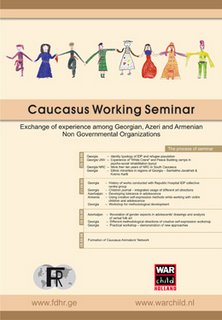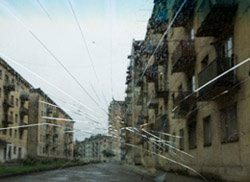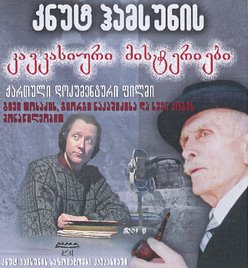Under Russian Siege
 Today it is 13 years since Georgian troops was evicted from Sokhumi, beaten by Abkhazian separatists, Russian Spetznaz troops, and Tchetchen terrorists lead by Basajev. It’s a day to remember the genocide in Abkhazia and the thousands of Georgian-Abkhazian refugees still living in Tbilisi and other places in Gerogia without any homes to return to. Maybe the memorial monument in front of the Georgian Parliament, reminding us of the 21 Tbilisians beaten to death with shuffles, and the thousands of others exposed to toxic gasses in a peaceful anti Soviet demonstration by Russian troops 9.th of April 1989, gives us a deeper and even more sinister back curtain to the recent development in the conflict between Russia and Georgia.
Today it is 13 years since Georgian troops was evicted from Sokhumi, beaten by Abkhazian separatists, Russian Spetznaz troops, and Tchetchen terrorists lead by Basajev. It’s a day to remember the genocide in Abkhazia and the thousands of Georgian-Abkhazian refugees still living in Tbilisi and other places in Gerogia without any homes to return to. Maybe the memorial monument in front of the Georgian Parliament, reminding us of the 21 Tbilisians beaten to death with shuffles, and the thousands of others exposed to toxic gasses in a peaceful anti Soviet demonstration by Russian troops 9.th of April 1989, gives us a deeper and even more sinister back curtain to the recent development in the conflict between Russia and Georgia. In the middle of Tbilisi the Headquarters of the Russian Troops in Trans-Caucasus are positioned well. Since the days before the collapse of the Soviet Union, Russian troops has been located all over the Georgia. Russia needs 4 years to pull 4000 troops out of Georgia, Putin says, and the process of withdrawal proceeds very slowly, after hard and neverending negotiations where the Russians demanded 11 years. Still the process doesn’t include the “peacekeeping” forces in Abkhazia and South Ossetia.
When will UN understand what kind of “peacekeepers” they have put in charge in Abkhazia?
The Russian troops in Tbilisi stays. To have the “neighbors” soldiers placed in your capitol is called occupation. Further more, to have Russian peacekeeping forces in two breakaway-republics Abkhazia and South Ossetia also seems odd. Especially when Russian officials, yesterday Putin, states that Russia will support the break away republics in their attempt as soon as Kosovo is recognized officially. What Kosovo has to do with it, is a result of Russian logic not for mortal people to understand. The rethoric battle between Tbilisi-government and Russian officials now seems to escalate into a pre-war condition in Kodori Gorge region, from today named Upper Abkhazia, where the self appointed Abkhazian government hold military excercises close to the Georgian police in the region, stating that the Russian support in possible military actions is granted. A Russian general is in fact training the troops, and leads the “exercise”.
The Russians actively supports anti Georgian separatists
At the same time: From Moscow comes the message from separatist warlord Kvitsiani, which occupied Svaneti earlier this summer, but was driven away by Georgian police: “We will take back Kodori Gorge and fight the Georgian government”. Georgian intelligence has established that Kvitsiani is safe in Moscow and makes his broadcasts from a known address in the city. Finally Russians states that they will support. The daily Russian threats is supported by harassments of Georgians traveling through Russia. The Russian signing in Turky of an agreement recognizing Georgian territorial demands doesn’t seem to hold up in the daily bashing of Georgia defending their territory. The Cocoo’s nest in Tbilisi continues to be a symbol of Russian imperialism and unwillingness to accept Georgia as a souverign state.
But there’s more worms in the woodwork
Igor Giorgadze, an Georgian exile mulitimillionaire living in Russia; accused for treason and the attempted killing of Shjevardnadze in the nineties is on the move. He is wanted by Interpol, but lives protected in Russia. He is the man behind the Samartlianoba, the “justice” party. It is a pro-russian movement financed by him, and with an expressed goal to overthrow the Georgian Government. That is what he says on television in Moscow. In September 2006 there was mass arrests in Tbilisi, detaining members of this and other movements for conspiracy and an attempted armed plot against Saakashvili and the Georgian government.
Russian foreign politics ; the way of a former colonial power
For me it seems like Russia never really understood that it was only a part of the Soviet Union and therefore in no natural position to inherit the Soviet supremacy from the golden era. The sharpest knives in the Russian shelf, like Shirinowsky and foreign minister Lavrov, continue to condemn the free states in the former union, urging them not to resist Russian supremacy. “It’s for their own good”, the message is. To further underline this message, power lines suddenly collapses, and in mysterious ways Georgian mineral water and wine is found contaminated, and therefore cannot be imported to Russia. But there is also the same problem in Moldova with “contaminated” wine. Maybe it is due to the situation with the breakaway republic Transdniester, held by Russian supported separatists.
The Russian method
Now this “contamination-procedure” is by no means a single Georgian event. Norwegian salmon has also been found “contaminated”, strangely enough shortly after the Norwegian Coastguard tried to stop the Russian trawler Elektron fishing illegally in the Norwegian zone in the Barentssee. The result was that the crew on the trawler kidnapped two of the Norwegian coastguards inspectors boarding the vessel., and released them only after harboring in Murmansk. The Russians exercise their territorial rights in a more firm way, as the killing of the crew on a Japaneese trawler accused of fishing in Russian territorial waters this autumn shows. Anyway, to avoid conflict the Norwegian coastguard did not fire at the Russian trawler although it did not respond to the coastguards repetitive attempts to stop it peacefully. Now the Norwegian Coastguard reports that Elektron is back in Norwegian zone fishing illegally again. And that is during the trial against the captain, now taking place in Murmansk.
So what happened with the Norwegian salmon?
The salmon was controlled by both Sweedish, Danish and EU laboratories, and found to be clean. No contamination what so ever. Not that it mattered much for the Russians. They now conduct inspections on every single fishfarm in Norway. And the procedure is strict and takes time. There is of course expected full treatment of the inspectors, including food and drinks at each plant.
This is foreign politics, peacekeeping and diplomacy The Russian way.
Sources:
Georgian Online Magazine, 2004-2006: www.civil.ge
Washington Post, 2004-2006: http://www.washpost.com/index.shtml
Russian Online Magazines, 2004-2006: http://rbc.ru/ and www.gazeta.ru
Norwegian Broadcasting, 2006
Aftenposten 2006. Norway







